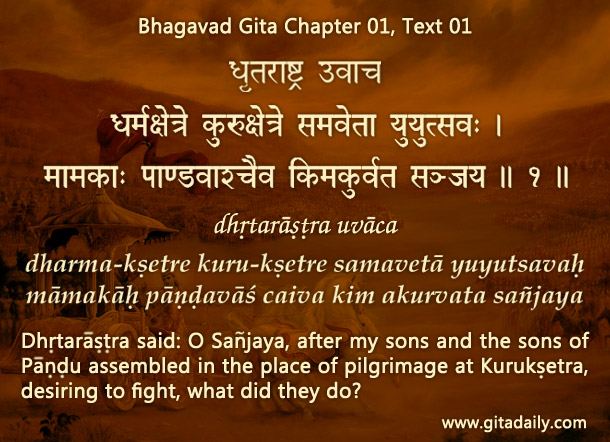In the Bhagavad-gita’s first verse spoken by Dhritarashtra, the first words mean ‘at the place of dharma’ (dharma-kshetre). In this verse, the blind king asks his assistant Sanjaya about the events on the Kurukshetra battlefield.
Dhritarashtra is infamous as the embodiment of attachment to the Kuru kingdom. And the place where the battle is happening is named after his dynasty: Kurukshetra. Yet that name doesn’t come first from his mouth; instead, the name that comes first is an ethical attribute of that place: it is a place of dharma. Here, dharma can be translated as virtue, duty, religion — essentially, the right thing to do.
Why does Dhritarashtra refer to the place’s ethical potency first? Because that potency was weighing heavily on his mind. He wondered how it might influence the battle. Would it dishearten his sons, given that they were impious, even vicious? Would it enliven the Pandavas, given that they were pious and virtuous?
Irrespective of Kurukshetra’s specific influence, malign or benign, on the warriors there, a key event that transpired there did have a lot to do with the name used here for it (dharma-kshetra): a profound discussion about dharma happened there. The Bhagavad-gita was spoken by Krishna to Arjuna. Indeed, ‘dharma’ is the key word in Arjuna’s starting question (02.07) that drives the entire Gita discussion. And ‘dharma’ occurs in Krishna’s last instructive verse (18.66). In the last reference to this discussion in the book, Sanjaya calls it a samvada (dialogue) about dharma (18.76).
Not only did the dharma-samvada occur at the dharma-kshetra, but the dharma-samvada fulfilled the import of the name dharma-kshetra. In fact, every place where the Gita is spoken can become a place of virtue — and so can every heart where the Gita is cherished.
One-sentence summary:
The Gita’s first word ‘dharma-kshetra’ indicates not just the place of dharma, but also the Gita as an immortal discourse about dharma — the speaking of the Gita at Kurukshetra made it an immortal dharma-kshetra.
Think it over:
- Why is dharma-kshetra an unlikely name to come first from Dhritarashtra’s mouth?
- Why did he refer to Kurukshetra as dharma-kshetra?
- How was the name dharma-kshetra fulfilled by the Gita?
***
01.10: Dhritarashtra said: O Sanjaya, after my sons and the sons of Pandu assembled in the place of pilgrimage at Kurukshetra, desiring to fight, what did they do?
To know more about this verse, please click on the image


There is no other word that can truly take the place of being the opening word. Not even God nor religion. It must be Dharma. When Arjuna was abandoning his kshatriya Dharma, Gita was spoken and hence is the very essence of Gita.
Second word is Kuru ( to act) is indeed the second essence – to act according to Dharma. Not talk about it or meditate but to act according to individual’s Dharma. An Individual’s Dharma flows from God’s decisions – birth in a family, faith, parents, siblings, gender, professional skills. To Do the right thing in any life situation is the Dharma.
Interesting comment.
GITA is DHARMA